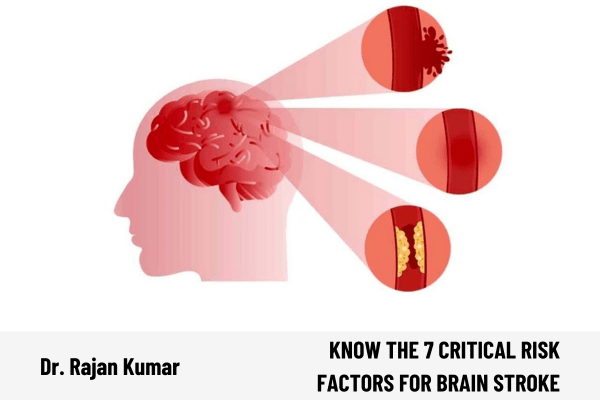A brain stroke, often referred to as a “brain attack,” is a medical emergency that can lead to severe and lasting consequences. Identifying and managing risk factors is crucial in preventing this potentially life-threatening condition. As the Best Neurosurgeon in Kolkata, I want to shed light on seven significant risk factors associated with brain strokes.
- Hypertension (High Blood Pressure): Uncontrolled high blood pressure is one of the most significant risk factors for brain strokes. Elevated blood pressure can damage blood vessels over time, making them more prone to rupture or blockage, leading to stroke.
- Smoking: Smoking not only increases the risk of heart disease but also damages blood vessels, reducing blood flow to the brain. It also promotes the formation of blood clots, which can cause strokes.
- Diabetes: Individuals with diabetes have a higher risk of stroke due to factors such as blood vessel damage, inflammation, and the potential for higher cholesterol levels.
- High Cholesterol: Elevated levels of low-density lipoprotein (LDL) cholesterol can lead to the buildup of fatty deposits in arteries (atherosclerosis). These deposits can block blood flow to the brain, increasing the risk of stroke.
- Obesity: Being overweight or obese can contribute to various risk factors for stroke, including high blood pressure, diabetes, and high cholesterol levels. Weight management is essential for stroke prevention.
- Atrial Fibrillation (AFib): AFib is an irregular heartbeat that can cause blood clots to form in the heart. If these clots travel to the brain, they can result in a stroke. Managing AFib is crucial in stroke prevention.
- Family History and Genetics: A family history of stroke or certain genetic factors can increase an individual’s susceptibility to stroke. Understanding your family’s medical history is essential for assessing your risk.
Conclusion
Brain strokes can have devastating consequences, but understanding and managing risk factors can significantly reduce the likelihood of experiencing one. Regular check-ups with a healthcare professional, lifestyle modifications, and appropriate medications are essential steps in stroke prevention. If you have concerns about your risk factors or have experienced stroke symptoms, seek immediate medical attention. As the Best Neurosurgeon in Kolkata, I am dedicated to raising awareness about stroke risk factors and providing expert care to those affected by this condition.

